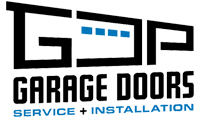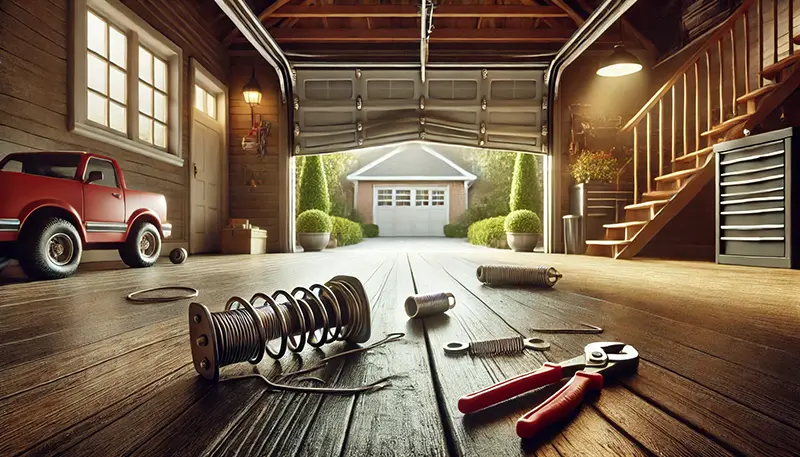When it comes to your home’s safety and functionality, your garage door plays a crucial role. It’s not just a barrier; it protects your belongings, enhances curb appeal, and provides convenience. But like any mechanical system, garage doors can develop issues over time. Ignoring these problems can lead to costly repairs—or even dangerous accidents. Here are the top five signs your garage door needs repair ASAP.
1. Unusual Noises During Operation
If your garage door begins to groan, squeak, or grind, it’s trying to tell you something. These noises often signal worn-out components or a lack of lubrication.
- Squeaking: This might mean the rollers or hinges are dry and need oiling. Left unaddressed, this can lead to wear and tear.
- Grinding: This could indicate a problem with the opener’s motor or misaligned tracks.
- Popping or Banging: These sounds may signal broken or loose springs.
Unusual noises don’t go away on their own. Address them quickly to avoid bigger issues like a total system failure.
2. Slow or Jerky Movement
A properly functioning garage door should open and close smoothly. If you notice it moving unevenly or taking longer than usual to operate, there might be underlying problems.
- Potential Causes: The tracks may be misaligned, the rollers could be damaged, or the opener’s motor might be failing.
- Risks: A slow or jerky door is not only inconvenient but can also put unnecessary strain on the system, leading to premature wear.
Don’t ignore these symptoms. Prompt repairs can save you money and ensure your door remains functional for years to come.
3. Sagging or Uneven Door
When your garage door looks lopsided or doesn’t close evenly, it’s a clear red flag.
- Check for Sagging: Disconnect the opener and manually lift the door halfway. If it doesn’t stay in place, your door might have balance issues.
- Possible Culprits: Broken or worn springs, frayed cables, or uneven tension in the system.
Ignoring a sagging door can compromise your home’s security and increase the risk of the door collapsing. Professional repair is essential to restore balance and prevent accidents.
4. Unresponsive or Intermittent Operation
If your garage door doesn’t respond to the remote or wall switch, or if it operates sporadically, there’s likely an issue with the opener or electrical system.
- Battery Check: Ensure the remote’s battery isn’t the problem.
- Sensor Alignment: Misaligned or dirty safety sensors can cause operational hiccups.
- Electrical Issues: Wiring problems or a malfunctioning circuit board in the opener could also be to blame.
An unresponsive garage door can be frustrating and potentially unsafe. A professional can diagnose the issue and recommend the right solution.
5. Visible Damage to Components
Inspect your garage door and its parts regularly. Visible damage can be a telltale sign that repairs are overdue.
- Broken Springs or Cables: These are high-tension components critical for the door’s operation. If they snap, the door may become inoperable—or dangerous to use.
- Cracks in Panels or Frames: This affects the door’s structural integrity and may worsen over time.
- Worn Rollers or Tracks: These can cause the door to derail, posing a safety risk.
Damaged parts should never be ignored. Immediate repair ensures your garage door operates safely and efficiently.
Why Quick Action Matters
Delaying garage door repairs can lead to:
- Higher Costs: Minor issues can escalate into major repairs or complete replacement.
- Safety Risks: A faulty garage door can injure people, damage vehicles, or leave your home vulnerable to break-ins.
- Inconvenience: A malfunctioning door disrupts your daily routine.
Acting quickly when you notice these signs will save you time, money, and stress.
When to Call a Professional
While some basic maintenance, like lubrication, can be done on your own, most garage door repairs require a trained technician. Professionals have the tools and expertise to handle high-tension components and electrical systems safely. If you notice any of the signs mentioned above, schedule a repair appointment as soon as possible.
Maintaining Your Garage Door
To prevent future issues, regular maintenance is key. Here are a few tips:
- Inspect Monthly: Check for visible wear and test the door’s balance.
- Lubricate Moving Parts: Use a silicone-based lubricant to reduce friction.
- Test Safety Features: Ensure sensors and auto-reverse systems work properly.
- Schedule Annual Tune-Ups: A professional inspection can catch small problems before they become big headaches.
Your garage door is an investment in your home’s safety and convenience. Paying attention to these warning signs and scheduling prompt repairs will keep your door in top condition. Don’t wait for a small issue to become a costly emergency—act now to protect your home and loved ones.

